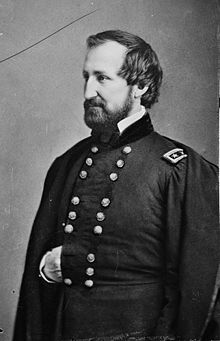William Rosecrans
William Starke Rosecrans (born September 6, 1819 at Little Tyler Run, Delaware County, Ohio; † March 11, 1898 at Redondo Beach, California) was a general in the Union Army during the War of Secession.
He was commissioned a cadet at the Military Academy at West Point, New York, on July 1, 1838, and graduated fifth out of 56 cadets. His classmates included future Confederate generals James Longstreet, Richard H. Anderson, D.H. Hill, and Earl Van Dorn, as well as Union generals Abner Doubleday, George Sykes, and John Pope. It was here that he received his nickname, "Old Rosy." Due to his good graduation record, Rosecrans was transferred to the United States Army Corps of Engineers as a lieutenant on July 1, 1842. After a brief stint in fort construction, Rosecrans was assigned as an instructor at the Military Academy until 1847. As a result, he did not take an active part in the Mexican-American War. In the following years he again worked in fort construction and participated in surveys.
Rosecrans was promoted to first lieutenant on March 3, 1853, and retired from the service on April 1, 1854. After his retirement, he worked for various coal mining companies until 1861, sometimes in an executive capacity. Before returning to the army in 1861, Rosecrans managed an oil refinery in Cincinnati, Ohio, where lamp oil was manufactured.
While serving at West Point, Rosecrans married Anna Elizabeth Hegeman on August 24, 1843. The marriage produced seven children, four of whom survived childhood.
Appointed commander of an Ohio regiment in 1861, he accompanied George B. McClellan to West Virginia in the Civil War, where he distinguished himself in the very first operations. At the battle of Rich Mountain (July 11, 1861), he and four regiments captured enemy entrenchments, for which he was promoted to brigadier general.
As commander-in-chief of the Army of West Virginia, he defeated the secessionist generals Floyd and Wise in fighting in the Kanawha Valley on September 10 and held his own in West Virginia during the winter. Entrusted with the command of the Mississippi military district in Halleck's place in July, 1862, he defeated the main Confederate army under Braxton Bragg at Murfreesboro on January 3, 1863, but suffered a defeat at the battle of the Chickamauga on September 19 and 20, in consequence of which he was obliged to remove to Chattanooga, where he was succeeded in October by General Thomas as commander-in-chief of the Cumberland army. Appointed chief of the Missouri department in 1864, he retired entirely from the army in 1866, was appointed envoy to Mexico by President Andrew Johnson in 1868, but was soon recalled by Ulysses S. Grant; he was succeeded by Thomas H. Nelson.
Rosecrans again engaged in civil engineering in Mexico and California and was a Democratic congressman for California's First Electoral District from 1881 to 1885. He died in 1898 at Rancho Sausal Redondo, Redondo Beach, California.

William Starke Rosecrans
Search within the encyclopedia